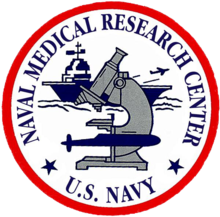Naval Medical Research Institute
| Naval Medical Research Center | |
|---|---|

The seal of the Naval Medical Research Center shows an optical microscope juxtaposed with outlines of an airplane, aircraft carrier, and submarine.
|
|
| Active | 1942–present |
| Country | United States |
| Branch | United States Navy |
| Type | Research and Development |
| Size | 1600+ |
| Part of | Bureau of Medicine and Surgery |
| Commanders | |
| Commanding Officer | CAPT Jacqueline Rychnovsky |
The Naval Medical Research Center (NMRC) is an agency that performs basic and applied biomedical research to meet the needs of the United States Navy and United States Marine Corps. Its areas of focus include study of infectious diseases, biodefense, military medicine, battlefield medicine, and bone marrow research. NMRC is under the United States Department of the Navy's Bureau of Medicine and Surgery.
NMRC was originally the Naval Medical Research Institute, founded in 1942, and was located on the campus of the National Naval Medical Center in Bethesda, Maryland. Besides researching health and safety issues for shipboard environments, it was involved in early radiobiology research after the development of atomic weapons, astronaut training during the 1960s Space Race, as well as the establishment of the Navy Tissue Bank and the National Marrow Donor Program.
The Navy Toxicology Unit, which had been founded in 1959 in response to air quality issues within USS Nautilus as well as toxicity concerns about replacements for flammable hydraulic fluids, was incorporated into NMRI in 1975 and moved the following year from Bethesda to Wright-Patterson Air Force Base in Dayton, Ohio so it could share resources with the Aerospace Medical Research Laboratory's Toxic Hazards Division. The unit later became the Environmental Health Effects Laboratory at Naval Medical Research Unit Dayton.
...
Wikipedia
